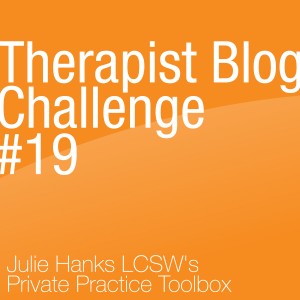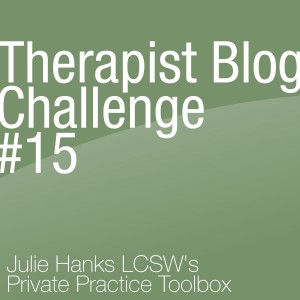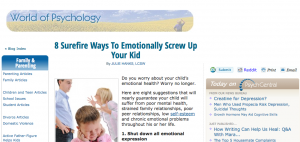 Therapist blog challenge #19 focuses on the experience of parenting a child with special needs.
Therapist blog challenge #19 focuses on the experience of parenting a child with special needs.
(Note: This is, of course an incredibly broad topic. Subtopics include welcoming a child with special needs into the family, helping siblings of kids with learning disabilities, helping adults with special needs, etc. Narrow it down as you see fit.)
[Headline] Write a title that gives readers a clear idea of what your post is about. You may use one of the following if you'd like:
How to Begin to Understand Parenting a Special Needs Child
A First Time Parent's Guide to Nurturing a Special Needs Child
An Emotional Survival Guide for Parents of Children with Special Needs
[Strong Intro] Lay out the topic with a little more detail in an opening paragraph. Below is an example:
Expectant couples eagerly wait to welcome a new little one into their family. But sometimes a soon-to-be mom and dad discover that their child will have special needs, which will significantly affect their experience. Other parents learn of their child's unique needs later in family life. No matter the age of the child or the kind of disability, first discovering about their child's physical, emotional, or mental challenges can be a very difficult situation for parents. Here are 4 steps to help them begin to navigate the experience:
[Scanable Content] Break your content into smaller, readable sections with a clear sub-heading.
Let Yourself Feel What You Feel
Learning that a special needs child will be joining your family can bring a flood of conflicting emotions. Some of these may include confusion, excitement, frustration, gratitude, inadequacy, nervousness, and joy. Acknowledge your full range of emotions without dismissing or judging them. Tune into what you feel, as they can help you gain perspective, clarity, and insight about how to navigate this new experience.
Grieve
Some parents may feel guilty for being (somewhat) saddened that their child is special needs (particularly if he/she has a severe disability). It's important to allow yourself to properly grieve your loss of expectations of how your family life might have been different. This doesn't make you a bad or ungrateful parent; it instead helps you accept the reality and begin a journey toward embracing the challenges and joys of having a special needs child. Take the time to grieve the loss of certain dreams that may no longer be possible or realistic.
Join a Community
There are no shortage of resources from parents who also have special needs children in their home. Take advantage of the countless blogs, professional publications, and meet-up groups that are available to you. Not only can you learn from other parents functional knowledge about such topics as your child's nutrition, education, and social development, but you can lean on others for emotional support during difficult challenges that you may encounter. You yourself can help provide comfort and support for others as well.
Take One Day at a Time
Beginning the journey of your new life with a special needs child is unlike anything you've ever done before. The learning curve is steep, and it's almost guaranteed that you will experience some worry, doubt, and confusion. Try to be patient with yourself, take things one step at a time, and celebrate the accomplishments and goals both you and your child reach along the way.
[Strong ending paragraph] The final paragraph wraps up your post and can include a summary of important points.
Although learning that your child has special needs can certainly be emotionally difficult, it can also be the beginning of a wonderful family opportunity to grow together and experience joy. This is a lifetime endeavor, and the learning process will never stop. By allowing yourself to grieve and feel a full range of emotions, reaching out to others for help, and taking small steps, you can successfully begin your new life as the parent of a special needs child.
Additional reminders about the Therapist Blog Challenge:
- Write and post your blog article in the next 2 weeks. If you miss the deadline or you read this article months later, that’s OK too. Post a link for this blog challenge in the comment section of this blog post.
- Read, comment, and share other therapist’s articles.
- Tweet your post using hashtag #therapistblog and tag @julie_hanks so I can retweet it.
- Pin it on the challenge Pinterest Board. I’ve invited everyone who posted a comment on the initial blog challenge post as collaborators so you can pin onto the group board.
- Spread the word and invite mental health colleagues to join the challenge. Articles can be added anytime throughout the year.
- Write no more than 600 words, make it easy to read, use a conversational tone, and gear your articles toward your ideal client (not other professionals).
- The goal of a professional blog is to provide value to your website visitors, help them get to know your professional perspective, increase traffic to your private practice website, and build your practice.
Join my Private Practice Toolbox Facebook group and connect with 3000 therapists around the globe in 2 simple steps: 1) Click request to join the group and 2) Fill out this brief questionnaire before you'll be added to the group.Get practice tips and blog updates in your inbox.
The Power of Online Presence: Blogger Dawn Friedman uses her Advanced SEO Skills to Rank High in Google
 Discover how some very successful mental health professionals use blogging, social media, and other technologies as powerful tools for their therapy practices.
Discover how some very successful mental health professionals use blogging, social media, and other technologies as powerful tools for their therapy practices.
Dawn Friedman, MSEd LPC, is a clinical counselor specializing in issues surrounding family building, including infertility, adoption, pregnancy, and parenting. An early adopter of technology, Dawn started a blog that became the basis of her strong online presence and has helped her grow a thriving practice. Read about her story here:
When and how did you first start putting time and effort into maintaining a strong online presence?
Back in 2001, I started a personal blog that I continued for about ten years. In that time, blogging went from a fairly introverted way to journal to a massive (and competitive) industry. Because I had started early, I got to see the field of blogging really take off and learn it as it happened. So when I turned to blogging for a private practice I hadn't opened yet (about a year before I planned to launch), I already had a strong understanding of how blogging and other social media work.
Starting my professional blog a year before my practice opened gave me time to play around with the design (in WordPress) and think about how to lay it all out. It also gave me the space to find my blogging voice. I wasn't sure how to switch from personal writing to more careful disclosure as a therapist, and it took some time and bumbling around to figure out how to be friendly, open, and myself without giving away so much information that it might overwhelm a potential client. I started out way too impersonal and over time let myself loosen up and have more fun with what I wrote. The advantage, too, of starting a year in advance is that having a living, breathing web site that was already getting some traffic made it much easier to start showing up in local searches once I was ready to launch. The blog was already going, and I just needed to focus on creating the pages that described my services, hosted my paperwork, etc.
Please describe what social platforms you currently use.
I used to do social media consulting on the side back in my personal blogging days. What I told clients was to go and claim your online real estate, which means grab the Twitter handles, the Instagram names, etc. Even if you're not going to use them, you don't want someone else to have them. So technically, I have most of the social platforms, but I don't use them all. Many of them you can keep alive passively (WordPress blogs will automatically post to Twitter, LinkedIn, Google Plus and Facebook if you're using JetPack). Once you have all your accounts lined up, you can figure out which ones make the most sense for you to put more work into.
For me, I put the greatest effort into my blog and website. I've worked very hard on my search engine optimization (SEO) and am on the front page for most of the local searches that I've targeted. The second place where I put in effort is on my Facebook page. I have a professional page and a personal account. My personal account is on lockdown with the privacy settings but I assume anything posted on the internet could potentially show up on a client's screen, so I bear that in mind when I'm posting. That said, I've found that Facebook is the social media site that will drive the most traffic -- especially local traffic, which is what I want -- to my site. I have my blog automatically post new updates to my professional page, and then I share from my page to my personal account. Since doing this, I've seen an increase in traffic, and more people have liked my page. So overall, I do invest some time into Facebook, but I'd rather spend more energy on my blog. It's a very personal choice, and there's no right way for everybody.
About how much time do you devote to your online presence? How do you balance it with your other work responsibilities?
Back in my journaling days, I would blog daily. Now, if I can post six to eight times a month, I'm pretty happy. I'd like to post more because I really enjoy it, but I just get too busy. Other than putting out new content, I also spend a few hours each month updating my site, playing around with my theme, changing out my front page picture, and looking at my stats to see where I can consolidate pages or tighten up my menu. I keep an eye on the number of hits the different pages get. For example, I realized that the part of my site that people clicked the least amount was "Services," so I turned it into a menu header. This led to an increase in clicks directly to services people are interested in. I also am always tweaking and adding things that might help my search engine optimization, which I think is a lot of fun because it's like a game!
What kinds of things do you use to inspire your content creation; what do you write about?
I usually write about things that tend to come up a lot in sessions. For example, many of the children I see struggle with anxiety, and I get quite a few questions about that subject too, so I wrote a three-part series on child anxiety. I also write about books I've read -- counseling related or not -- share fun music videos, and highlight local events that my potential and current clients might be interested in.
I will add that sharing local resources helps me in several ways: It gives me a writing topic, it allows me to share good information with readers who will welcome it, it lets me to network to get that resource up on my blog, and it improves my local SEO. I mean, it's fun to get readers from all over the world but unless you live within driving distance to my office, you're unlikely to become a client or refer me to someone you know. Sharing local events makes it clear that I want to be a resource for my community here in town, and it's also much more likely to be shared by locals on Twitter or Facebook. Win/win!
Back when I did social media consulting, I'd tell people to share the kinds of things you might find yourself talking about at a dinner party. What interesting, fun anecdotes do you have? What thought provoking things have you come across? Even though things like SEO and header tags are important, sometimes you have to put aside the worry and just write. Find your voice first, and your blog will benefit you even if you don't do all that social media stuff "right." Trust me on this. If people like what you write, they will share it, and that will help your traffic. Also, people who click to you from a directory or a Google search will have the opportunity to get to know you, which will increase the chance that the people who call you will be a good fit for your practice.
Just write!
How do you best balance personal and professional in your online activities? Please give examples.
This was a tricky thing to figure out, and it's something that I still reflect on regularly since I think ethics demand that we always be thoughtful and aware about what we share and how that might impact our clients. I do know that I tend to be more comfortable with disclosure than some therapists, and I think that's a matter of personal style. On the other hand, I've seen therapists share way, way more than I'd be willing to do (And I say this having lots of published essays out there that will give any client with Google the opportunity to learn my kids' names, my political beliefs and my personal philosophies on a whole bunch of things).
Generally, I've decided that I will share anything on my blog that I might share in a session. For example, I might write about a parenting challenge I've faced personally to illustrate a developmental phase presenting in a client's family because that's something we might talk about together in my office (Note: I always get my kids' permission before posting stories about them). When I want to write about something that might make a client even slightly worry that I'm talking about him/her, I'll write about a fictional character. In the series on anxiety, instead of using a fake Jane Doe, (which might lead a client to think I'm writing about his or her child) I wrote about Goldilocks. This allows me to illustrate ideas without threatening anyone's therapeutic relationship. I've written about Harriet the Spy and Ramona Quimby, too, to talk about kids. Other therapists might like using characters on television shows or movies. Using fictional characters not only protects clients from thinking they're seeing themselves in what you write, it's also a fun way to call out cultural touchstones that speak to you.
What is some tangible evidence that your online presence has grown your business?
I've had many clients come to see me because of something they've read on my blog. Someone will share something I wrote on Facebook, and another person will see it, click through, and see that I'm a therapist and then call me. I've also had people go looking for a therapist and stop to read my blog first. Sometimes people tell me that they've read my blog for several weeks or months before making that leap. Having that updating, ongoing resource made it easier for them to feel safe making the call. Some clients say that they want to see me even though I don't take their insurance because they like what I said about a particular topic or feel like they would be comfortable with me. In other words, they want to see me, not just whatever therapist answers the phone first.
Also my blog and attention to SEO has kept me on the front page of local Google searches for my target market. That's huge and has definitely been a tremendous help in my practice building. It's not just potential clients, either. Referral sources use Google, too.
Besides attracting clients, what other ways has your strong online presence helped you?
My blog has helped me secure speaking and writing gigs. I've stepped way, way back on my professional writing since working on my practice, but both my personal blog and professional blog have brought editors to me. Networking is also easier when you have a great web site. It's fun to meet someone for coffee and have them say, "I already know this about you..." It makes starting those conversations easier.
What have been some of the biggest challenges you’ve encountered creating and maintaining your online presence?
There were some technical challenges I had when I first started my professional blog. I was using the URL I had used for my personal blog so that I wouldn't lose out on traffic. I had to change the URL and needed a 301 redirect to maintain that traffic. This is one of those things that sounds scary and complicated, but is actually pretty easy. There's a great explanation of how to do this on Wordpress if you're ever in need.
Beyond that, it's easy to become overwhelmed or to think you need to use every bell and whistle available. I tend to try out new things for a little while, then drop them if they're not useful. Part of this is that I just like learning this stuff, but I do have to watch my time constraints. It's way more fun to me to create a great, shareable image on Canva than it is to write up my case notes, so sometimes I reward myself with online tweaking when I'm all caught up on paperwork.
Also it's tempting to save things. Like save that great metaphor for my next talk, or save that terrific example for writing I might publish elsewhere. I've since learned that the more I give, the more I have to give. Memoirist Annie Dillard said:
"One of the things I know about writing is this: spend it all, shoot it, play it, lose it, all, right away, every time. Do not hoard what seems good for a later place in the book or for another book; give it, give it all, give it now. The impulse to save something good for a better place later is the signal to spend it now. Something more will arise for later, something better. Anything you do not give freely and abundantly becomes lost to you. You open your safe and find ashes."
It's true. The more you write, the more you share, the more you will create. To hold back is a little bit like never adding weights to your lifting routine because you want to save it for when you're stronger. It's the exact opposite really.
What tips or resources can you recommend to help therapists who are new to the online world of blogging, social media, SEO, etc.?
I really like Amy Lynn Andrews for her series on starting a blog. I send her information to people all of the time. It's clear, it's easy to implement, and it works. I also like her newsletter for staying up to date on different tools that might be useful. She's not specific to counseling, but I always learn something, and even though she's super beginner-friendly, she also points to other resources for when you're ready to dig deeper into social media and SEO.
Dawn Friedman MSEd LPC
Website: www.BuildingFamilyCounseling.com
Facebook: www.facebook.com/BuildingFamilyCounseling
Therapist Blog Challenge #15: Parenting Tips
 It's been a few weeks since our last Therapist Blog Challenge, but I'm ready to hit the ground running again if you are!
It's been a few weeks since our last Therapist Blog Challenge, but I'm ready to hit the ground running again if you are!
Therapist blog challenge #15 focuses on parenting defiant young children. This is something that every parent has experienced, and you as a professional may be able to provide some insight on this topic. Use the following format as a guide for how to best structure your blog post.
[Headline] Come up with a catchy title for your blog post. You may write your own or use one of the following:
How to Survive When Your Toddler's Driving You Crazy!
5 Steps to Make it Through the Terrible Twos
Keeping Your Cool With a Defiant Child
[Strong Intro] Lay out the topic with a little more detail and introduce your reader to your main points. Here's an example:
It's only 10 am, and your 2-year-old has already suffered a major meltdown. You were warned that the toddler years were tough, but you never expected anything like this! Here are 5 ways to survive with a defiant toddler.
[Scanable Content] This is the real meat of your blog post. Make sure to format your content in a way that is easy on the eyes by breaking it up into sections instead of just writing one long paragraph. Be sure to flesh out the details under each sub-topic.
1) Don’t lose control
Write a short paragraph about why it's important for a parent to stay in control. This may include explaining how a situation can escalate if an adult gets angry and how a child is more likely to respond positively to a parent who is calm.
2) Don't lose focus on who is responsible
Write a short paragraph about how parents need to remember that they are the ones responsible for helping their toddler. True, they cannot force a child to stop crying or acting out, but the parents are the adults and ultimately have the responsibility to improve the situation.
3) Pay attention to the positive
Now, write about ways that parents can recognize the good, even when a toddler has a meltdown. Has the child gotten a bit better since the last outburst? Has a parent improved in becoming more patient or more firm in his/her approach? Write how there is something positive to be gleaned even from difficult situations with defiant toddlers.
4) Don’t assume the worst
Write about ways in which a parent can remember that even the most difficult toddler doesn't have bad intentions. It's easy to become overwhelmed with stress and frustration, but parents should remember how young these children are. Remind your readers that defiant toddlers are still developing and are certainly not trying to cause trouble.
5) Set limits for your defiant child
Explain why setting limits for a child's behavior is crucial. Elaborate on how limits help your child learn consequences, how they can be appropriate punishment, and how limits can help a parent put an end to a tantrum.
[Strong Ending Paragraph] Here's where you wrap it up. Just one short paragraph to briefly summarize your main points will do. You may want to close with a question, such as "How have YOU best dealt with a defiant toddler?"
That's it. Now, get to writing!
Here are a few additional reminders about the blog challenge:
- Write and post your blog article in the next 2 weeks. If you miss the deadline or you read this article months later, that’s OK too.
- Post a link for this blog challenge in the comment section of this blog post.
- Read, comment, and share other therapist’s articles.
- Tweet your post using hashtag #therapistblog and tag @julie_hanks so I can retweet it.
- Pin it on the challenge Pinterest Board. I’ve invited everyone who posted a comment on the initial blog challenge post as collaborators so you can pin onto the group board.
- Spread the word and invite mental health colleagues to join the challenge. Articles can be added anytime throughout the year.
- Write no more than 600 words, make it easy to read, use a conversational tone, and gear your articles toward your ideal client (not other professionals).
- The goal of a professional blog is to provide value to your website visitors, help them get to know your professional perspective, increase traffic to your private practice website, and build your practice.
Here's a list of previous blog challenges. Feel free to revisit!
10 Ways To Become A Go-To Media Expert In Your Field
 Want to tell thousands of people about your practice? Tips to landing regular media interviews.
Want to tell thousands of people about your practice? Tips to landing regular media interviews.
What do you think of when you think of professional networking? Private practice therapists who I’ve worked with in business consultations usually consider networking to be meeting with other like-minded professionals for lunch or handing out business cards to physicians offices. While those are important ways to make connections that build your therapy practice, there are other ways to get the word to thousands and thousands of people in one shot, instead of just a few folks at a time. Rarely do therapists think of networking with producers, reporters and journalists.
Over the last few years I’ve focused on developing relationships with producers, journalists, and reporters in various media platforms. There are a few who now contact me for quotes when they need expert quotes or interviews. I've landed regular local TV, radio, and news interviews as well as interviews with top-tier publications and shows: Wall Street Journal, Fox News, Parenting, Woman's Day, Women's Health, and others. Here are some things I’ve learned about what works when building relationships with reporters, journalists and producers.
1) Seek out opportunities
Keep an eye out for opportunities to interview with local and national reporters. Sign up for services that notify you of reporters looking for interviews, like Reporter Connection, ProfNet Connection, Expert Engine. Contact local radio, television, and newspaper companies and offer your expertise on newsworthy topics.
2) Know what’s ‘newsworthy’
When pitching stories or interview topics to local journalists and reporters it’s crucial to know what they’re looking for. Sorry, but the fact that you’re going into private practice specializing in family therapy is not newsworthy; however, news and other TV programs might be interested in getting your thoughts on a new study showing how cultivating self-compassion helps individuals manage divorce. I suggest getting into some “media-minded” habits:
- Watch national news headlines. Pitch a local spin on those stories to local TV producers.
- Suggest seasonal topics. Pitch interviews around managing holiday stress, or Halloween safety tips for children in October.
- New research is “news.” Keep an eye out for interesting research that’s relevant to your practice and offer to interview.
While what counts as newsworthy must be modified to your particular practice and community, MediaCollege.com generally defines a story as newsworthy if it has the following characteristics:
- Timing – News is all about stories that are current and new
- Significance – Something that affects large numbers of people
- Proximity – An event happening close to home
- Prominence – Involves someone famous or well-known
- Human Interest – Appeals to emotion, novel, off-beat, interesting
3) Know how to write a press release
When pitching to media you need to speak their language, which means learning how to write a press release.
- A press release needs to be in a specific press release format. Here’s an excellent example: EReleases.com.
- Read other releases. Here’s a release I helped one of my therapists at Wasatch Family Therapy, LLC write one recently based on her dissertation research: Mean Girls Get Married: Teens Don’t Always Grow Out of Mean Girl Behavior and End Up Using Emotional Manipulation On Spouse.
- Don’t send attachments. When you email a press release (or a pitch/proposal) to local news and TV producers, cut and paste it in the body of the email, do not send as an attachment (it’s one more thing that makes their job more difficult).
4) Respond to requests ASAP
I’ve come to realize that journalistic deadlines are incredibly tight, and the sooner I respond, the better. I’ve interviewed one afternoon for an E! Online article and it posted that same evening. When I get an email request for an interview I will respond right then on my smart phone with comments off the top of my head. I’ve been known to pull over on the side of the road while driving carpool to respond to an interview request. If a reporter or producer contacts you, respond immediately or the opportunity will pass you by. Decide ahead that you’ll say “yes” (and think about how you can make it a positive and confident “yes”).
5) Speak in layman's terms
Talking with the popular media is different than talking with colleagues. When speaking with therapists we can talk in short hand with acronyms like DBT, CBT and EFT; we know what transference and countertransference are, but most people don’t know and don’t care. In pitches and in correspondence always use layman’s terms that can be easily understood even if someone’s never taken Psychology 101.
6) Let your passion show
I think part of why I’ve been successful in getting quoted in national publications is because I show my passion for the work and for the topic of the story or article. Even in email correspondence, don’t be afraid to show your personality and to be approachable. I also openly share my gratitude for the interview opportunity and how much I enjoy media interviews.
7) Make your contact info easy to find
In all correspondence make sure that your name and credentials (the way you’d like them to appear if you’re quoted), your email address, and your cell phone number are easy to find in any correspondence or voicemail. Reporters don’t have time to hunt you down.
8) Know how to make their job easier
Reporters, producers, and journalists are extremely busy and always on multiple deadlines. They don’t have time to calm your anxiety or to walk you through the interview process.
- Send only relevant information. Highlight the most important information you’d like to talk about and a brief line or two about you and your practice or your “basic professional practice message” (see my elevator speech post). Through a brief stint as a producer and host of a local lifestyle TV show I learned what makes a good and a difficult interviewee. One of the hardest parts of screening potential guests was skimming through too much information hunting for the relevant points. You can always add more information as needed.
- Limit your correspondence. Respect the reporter’s, journalist’s or producer’s time. Though getting an interview might be a big deal for us as the therapist, it’s just one of many details they are trying to juggle.
- Know their demographics. Understand the demographic for a given newscast TV show, newspaper, or magazine so you can pitch relevant and helpful topics (have some “audience awareness”; if you don’t know the primary audience, ask).
9) Ask them to contact you again
At the end of each interview or correspondence, whether you interview or not, be sure to ask them to keep you in mind as a resource in the future and to keep your contact information should they need your expertise in the future. If you’re an easy expert to work with and you are eager to interview, my experience is that many journalists will take you up on your offer to interview again.
10) Be a resource
I’ve learned that offering myself as a resource is a great way to build bridges with the media. I often tell reporters, producers, and journalists contact me whenever they need someone to interview on a mental health or family relationship topic, and that if I can’t do it, or don’t feel qualified, I will find them someone who would do an excellent job.
5 Keys To Writing Killer Blog Post Titles
Is your great blog content hiding behind boring or predictable titles?
Next time you're browsing the web, notice the articles that catch your eye and pique your interest. What is it about them that interests you enough to click through and look at the content? Often, all that you have to go by is the article title.
Titles matter.
I was just reminded of the importance of blog post titles over the weekend when I posted an article on PsychCentral's World Of Psychology Blog. The article was titled "8 Surefire Ways To Emotionally Screw Up Your Kid." Within 24 hours the post had been shared over 1000 times on Facebook and had been retweeted 100 times on Twitter.
What was it about this post that made it popular and sharable? It all started with the totally unexpected title that piqued people's interest.
5 Key Questions When Titling Posts
1) Does it make you go "huh?"
Is there some kind of twist you can give the title that piques readers interest? For my "8 Surefire Ways" post I wanted to give it a different approach. There are millions of how-to parenting posts on the Internet, so I wanted to do something unexpected while still being helpful.
2) Is your title relevant to the content?
You don't want to g0 with a catchy title that has nothing to do with the content. Your post title should accurately reflect the article content or you risk losing your reader's trust and decreasing your traffic. One of the favorite titles of a recent blog post was 20 Ways Shrinks Stay Sane, where I interviewed therapists around the globe on how they take care of their own emotional health. It was clever and reflected accurately what the post content had in store for readers.
3) Can you say it in fewer words?
If you can title a post with fewer words, then do it. If titles are too long they make it more difficult to share through social media. I titled a recent blog post What The Heck Is Social Collaboration? A less effective title would have been Why Therapists Need To Know About Social Collaboration: What It Is And How To Use It.
4) Does the title include keywords?
Whenever possible, use keywords in the title of your blog post so people searching for your topic can easily find your content. For example, this post is titled 5 Keys To Writing Killer Blog Post Titles. The keywords are blog, post, and titles.
5) Is it in layman's terms?
When writing for the general public, avoid psychobabble, and write titles in language that is understandable to everyone. For example, one of my colleagues wrote a blog post called Mean Girls in Marriage. That title is more approachable than using Relational Aggression In Female Partners After Marriage.
Coming up with great blog post titles is an art that takes practice. It helps me to brainstorm with colleagues or family members to see which titles work best. Do you need feedback on a blog post title that you're working on? Feel free to post it in the comment below and I'll give you my feedback!


As healers, we genuinely like to do our work. Guiding clients through the therapy process and seeing them make progress is why we do what we do. But if you're in private practice, you know there's a lot going on in the back end and that it's crucial to run an efficient and organized business.